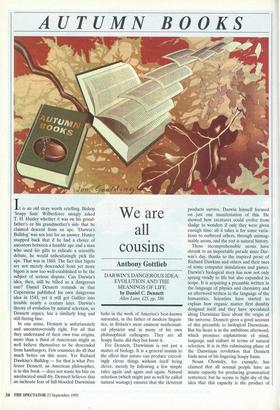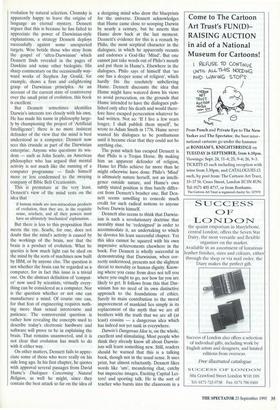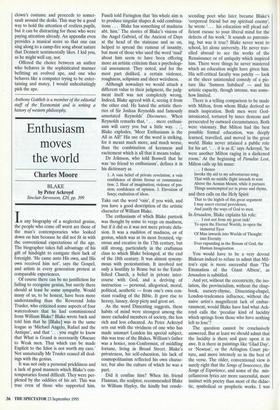AUTUMN BOOKS
We are all cousins
Anthony Gottlieb
DARWIN'S DANGEROUS IDEA: EVOLUTION AND THE MEANINGS OF LIFE by Daniel C. Dennett Allen Lane, £25, pp. 586 It is an old story worth retelling. Bishop `Soapy Sam' Wilberforce smugly asked T. H. Huxley whether it was on his grand- father's or his grandmother's side that he claimed descent from an ape. 'Darwin's Bulldog' was not lost for an answer. Huxley snapped back that if he had a choice of ancestors between a humble ape and a man who used his gifts to ridicule a scientific debate, he would unhesitatingly pick the ape. That was in 1860. The fact that bigots are not merely descended from yet more bigots is now too well-established to be the subject of serious dispute. Can Darwin's idea, then, still be billed as a dangerous one? Daniel Dennett reminds us that Copernicus published his own dangerous idea in 1543, yet it still got Galileo into trouble nearly a century later. Darwin's theory of evolution by natural selection, so Dennett argues, has a similarly long and still fizzing fuse.
In one sense, Dennett is unfortunately and uncontroversially right. For all that they understand of their own true origins, more than a third of Americans might as well believe themselves to be descended from hamburgers. Few countries do all that much better on this score. Yet Richard Dawkins's Bulldog — for that is what Pro- fessor Dennett, an American philosopher, is in this book — does not waste his bite on uneducated small-fry. Dennett believes that an inchoate fear of full-blooded Darwinism lurks in the work of America's best-known naturalist, in the father of modern linguis- tics, in Britain's most eminent mathemati- cal physicist and in many of his own philosophical colleagues. They are all Soapy Sams, did they but know it.
For Dennett, Darwinism is not just a matter of biology. It is a general maxim to the effect that nature can produce exceed- ingly clever things without itself being clever, merely by following a few simple rules again and again and again. Natural selection (which might just as well be called natural wastage) ensures that the cleverest products survive. Darwin himself focused on just one manifestation of this. He showed how creatures could evolve from sludge to wonders if only they were given enough time: all it takes is for some varia- tions to outbreed others, through unimag- inable aeons, and the rest is natural history.
Those incomprehensible aeons have shrunk to an inspectable parade since Dar- win's day, thanks to the inspired prose of Richard Dawkins and others and their uses of some computer simulations and games. Darwin's biological story has now not only sprung vividly to life but also expanded its scope. It is acquiring a preamble written in the language of physics and chemistry and an afterword written in the language of the humanities. Scientists have started to explain how organic matter first dumbly designed itself and they have speculated along Darwinian lines about the origin of the universe. Dennett gives a good account of this preamble to biological Darwinism. But his heart is in the ambitious afterword, which promises explanations of mind, language and culture in terms of natural selection. It is in this culminating phase of the Darwinian revolution that Dennett finds most of his lingering Soapy Sams.
Noam Chomsky, for example, has claimed that all normal people have an innate capacity for producing grammatical sentences; but he seems to fight shy of the idea that this capacity is the product of evolution by natural selection. Chomsky is apparently happy to leave the origins of language an eternal mystery. Dennett argues that this is because he has failed to appreciate the power of Darwinian-style explanations, a strategy Dennett deploys successfully against some unexpected targets. Woe betide those who stray from the gospel of 'ultra-Darwinism' which Dennett finds revealed in the pages of Dawkins and some other biologists. His sharp commentary on the occasionally way- ward works of Stephen Jay Gould, for example, shows a firm and enlightening grasp of Darwinian principles. As an account of the current state of controversy over the small print of evolution, this book is excellent.
But Dennett sometimes identifies Darwin's interests too closely with his own. He has made his name in philosophy large- ly by championing the project of 'Artificial Intelligence'; there is no more insistent defender of the view that the mind is best understood as a computer. Dennett now sees this crusade as part of the Darwinian enterprise. Anyone who questions its wis- dom — such as John Searle, an American philosopher who has argued that mental activity is not much like the running of a computer programme — finds himself more or less condemned to the swaying company of Bible Belt Creationists.
This is premature at the very least. Dennett's view of the mind rests on the idea that
if human minds are non-miraculous products of evolution, then they are, in the requisite sense, artefacts, and all their powers must have an ultimately 'mechanical' explanation.
But there is less to this proposition than meets the eye. Searle, for one, does not doubt that the mind's activity is caused by the workings of the brain, nor that the brain is a product of evolution. What he queries is how much light can be shed on the mind by the sorts of machines now built by IBM, or by anyone else. The question is not whether the brain can be regarded as a computer, for in fact this issue is a trivial one. On the abstract definition of 'comput- er' now used by scientists, virtually every- thing can be considered as a computer. Nor is the question whether or not one can manufacture a mind. Of course one can, for that feat of engineering requires noth- ing more than sexual intercourse and patience. The controversial question is rather how revealing the concepts used to describe today's electronic hardware and software will prove to be in explaining the brain. That remains unanswered, and it is not clear that evolution has much to do with it either way.
On other matters, Dennett fails to appre- ciate some of those who were really on his side long ago. In his first chapter, he quotes with approval several passages from David Hume's Dialogues Concerning Natural Religion, as well he might, since they contain the best attack so far on the idea of a designing mind who drew the blueprints for the universe. Dennett acknowledges that Hume came close to scooping Darwin by nearly a century, but he asserts that Hume drew back at the last moment.
Dennett's evidence for this is a remark by Philo, the most sceptical character in the dialogues, in which he apparently recants and endorses a God-like 'Mind'. But one cannot just take words out of Philo's mouth and put them in Hume's. Elsewhere in the dialogues, Philo says of himself that 'no one has a deeper sense of religion', which hardly fits the resolutely unbelieving Hume. Dennett discounts the idea that Hume might have watered down his views to avoid persecution, on the grounds that Hume intended to have the dialogues pub- lished only after his death and would there- fore have escaped persecution whatever he had written. Not so: 'If I live a few years longer, I shall publish them myself, he wrote to Adam Smith in 1776. Hume never wanted his dialogues to be posthumous until it became clear that they could not be anything else.
The point which has escaped Dennett is that Philo is a Trojan Horse. By making him an apparent defender of religion, Hume let Philo achieve far more than he might otherwise have done. Philo's 'Mind' is ultimately nature herself, not an intelli- gence outside nature, and Hume's own subtly stated position is thus barely differ- ent from Dennett's brasher one. But Den- nett seems unwilling to concede much credit for such radical notions to anyone before Darwin himself.
Dennett also seems to think that Darwin- ism is such a revolutionary doctrine that morality must be 'redesigned' in order to accommodate it, an undertaking to which he devotes his least successful chapter. Yet this idea cannot be squared with his own impressive achievements elsewhere in the book. For Dennett is wholly successful in demonstrating that Darwinism, when cor- rectly understood, presents not the slightest threat to morality or human dignity. Know- ing where you came from does not tell you where you ought to go, nor how far you are likely to get. It follows from this that Dar- winism has no need of its own distinctive approach to the foundations of ethics. Surely its main contribution to the moral improvement of mankind lies simply in its replacement of the myth that we are all brothers with the truth that we are all (at least) cousins — a dangerous idea which has indeed not yet sunk in everywhere.
Darwin's Dangerous Idea is, on the whole, excellent and stimulating. Most people who think they already know all about Darwin- ism will learn something new. Still, readers should be warned that this is a talking book, though not in the usual sense. It uses print, but almost reluctantly. Dennett likes words like `um', meandering chat, catchy but imprecise images, Exciting Capital Let- ters! and sporting talk. He is the sort of teacher who bursts into the classroom in a clown's costume and proceeds to somer- sault around the desks. This may be a good way to hold the attention of restless pupils, but it can be distracting for those who were paying attention already. An appendix even provides a musical score so that one can sing along to a camp-fire song about nature that Dennett sentimentally likes. I kid you, as he might well say, not.
Offered the choice between an author who behaves in the sophisticated manner befitting an evolved ape, and one who behaves like a computer trying to be enter- taining and matey, I would unhesitatingly pick the ape.
Anthony Gottlieb is a member of the editorial staff of the Economist and is writing a history of western philosophy.




































































 Previous page
Previous page